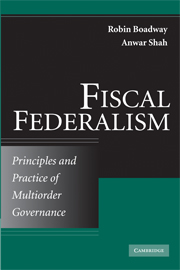Book contents
- Frontmatter
- Contents
- Preface
- PART ONE DESIGNING FISCAL CONSTITUTIONS
- 1 Introduction to Federalism and the Role of Governments in Federal Economies
- 2 The Decentralization of Government Authority
- 3 Expenditure Assignment
- 4 Revenue Assignment
- 5 Natural Resources Ownership and Management in a Federal System
- 6 Local Governance in Theory
- 7 Local Governance in Practice
- PART TWO REVENUE SHARING AND FISCAL TRANSFERS
- PART THREE FINANCE AND PROVISION OF PUBLIC SERVICES
- PART FOUR CHALLENGES AND RESPONSES
- References
- Index
4 - Revenue Assignment
Published online by Cambridge University Press: 05 June 2012
- Frontmatter
- Contents
- Preface
- PART ONE DESIGNING FISCAL CONSTITUTIONS
- 1 Introduction to Federalism and the Role of Governments in Federal Economies
- 2 The Decentralization of Government Authority
- 3 Expenditure Assignment
- 4 Revenue Assignment
- 5 Natural Resources Ownership and Management in a Federal System
- 6 Local Governance in Theory
- 7 Local Governance in Practice
- PART TWO REVENUE SHARING AND FISCAL TRANSFERS
- PART THREE FINANCE AND PROVISION OF PUBLIC SERVICES
- PART FOUR CHALLENGES AND RESPONSES
- References
- Index
Summary
Decentralizing revenue-raising responsibilities is one of the most unsettled issues in fiscal federalism. The dispute concerns the extent and method of decentralizing expenditure responsibilities, with relatively little debate about its merits. It is common in federations to decentralize the provision of major public services in areas of health, welfare, and education, as well as the provision of public goods and services of purely state or local concern, such as roads, water, and sanitation. Some of these programs are of national importance. Federations differ considerably, however, in the extent to which they accompany expenditure decentralization with revenue-raising responsibilities. For example, in Canada and the United States, provincial or state levels of government enjoy considerable revenue-raising autonomy with access to virtually the same broad-based taxes as the federal government. On the contrary, in Australia and Germany, while the states and Länder are responsible for delivering health and education services, they rely heavily on transfers from the federal government for their financing and have no direct access to income or general sales taxes. In both cases, they share sales tax revenues with the federal government through revenue-sharing arrangements, but this leaves them with no independent revenue-raising discretion of their own.
The reason for this disparate situation is that the case for decentralizing revenue-raising responsibilities is much less clear-cut than for expenditures. Perhaps the strongest political argument is that of accountability, a notion that is not easy to formulate or verify.
- Type
- Chapter
- Information
- Fiscal FederalismPrinciples and Practice of Multiorder Governance, pp. 157 - 206Publisher: Cambridge University PressPrint publication year: 2009
- 1
- Cited by



